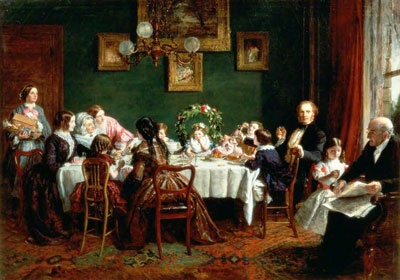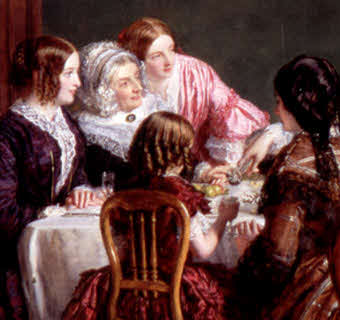
A room with cleverly calculated proportions: wide enough and with a high enough ceiling to simultaneously convey the harmonious yet contrary impressions of warmth and relief. It easily accommodates the furniture, paintings, chandelier, and people with enough space for them to move about naturally, without bumping into something or someone. The furnishings are not luxurious. They are solid, decent, comfortable, pleasant to look at, and also lend themselves handily to human use. There is a good, spacious table to sit a large family and accommodate without disorder all the modest but healthy delicacies served during a birthday lunch of a family from the small or middle bourgeoisie. The chairs are well designed in mild shapes and are strong enough to last indefinitely. There is a large, simple, commercial-grade carpet which gives the room some warmth. Their clothes are fully consistent with the environment. They are made of good fabric, comfortable, and with a cut not lacking a certain bourgeois distinction. The maid, though with a more modest presentation, is dressed with decency and comfort. Through the window, protected by a curtain, enters a mild light largely sufficient for the whole room but gauged so as not to hurt people’s eyes and to maintain a calm and temperate clarity in the ambience.
* * *
Calm, temperance, pleasantness: behold the dominant notes of this painting. The highly modest costumes give an aspect of purity to this family life, which in turn explains why their conviviality is so pleasant. In a family invaded by the gnawing worm of impurity, souls do not have the wholesomeness or freshness to delight in chaste affections such as those of home. Everyone feels happy and relaxed in this environment, knowing they are esteemed, supported and given the consideration they deserve.
* * *
 We intentionally spoke of consideration. Note the position of the old couple. The family’s greatest affection is turned to them. The two daughters flank their mother, full of respectful affection. The girl feels happy and honored to present her grandfather a drink, under the watchful and friendly gaze of that mature old man.
We intentionally spoke of consideration. Note the position of the old couple. The family’s greatest affection is turned to them. The two daughters flank their mother, full of respectful affection. The girl feels happy and honored to present her grandfather a drink, under the watchful and friendly gaze of that mature old man.
* * *
To the children’s delight, they also have a place at this meeting. The two boys chat happily as another child is lovingly tended to by his mother. A little farther, another child, with a tranquil temperament, enjoys her peace and quiet. Meanwhile, the little birthday girl, happy and serious like a queen under her flowery arch, has just tasted a delicacy and her gaze wanders around the room, at the same time carefree and attentive. But if the children play a large role in this picture, they are not its dominant note.
* * *
This comfortable, healthy, placid and chaste ambience could even be compared to that of Buissonnets in Lisieux, the home of St. Therese the Little Flower, if only the room also had some statue or supernatural note that transcended, illuminated and elevated even further this domestic ambience so rich in the traditional values of an authentic Christian civilization. In short, it is an ambience that favors the health of mind and body and admirably prepares people’s spirits to practice solid, balanced and stable virtue.
[like url=https://www.facebook.com/ReturnToOrder.org]
* * *
Anonymity, hurry, worry, rat race. While some quickly swallow their share of fast food, others wait for their turn. No one smiles. One or the other person says something, but there is no conversation. Everyone thinks about the work they have done or will do. Many men wear a hat, as in a train or bus station. Note, however, how these characters are dressed: they all come from the average or small bourgeoisie: Precisely the level of the family in the painting above. This is the interior of a fast-food restaurant in a large modern city. And this is how millions of people eat their lunch (and many also their dinner) almost every day of the year.
What Does Saint Thomas Say About Immigration?
How could it be otherwise? Large agglomerations bring about a concentration of business and a fast-paced life made even more hectic by the vertiginous ease with which radio, the telegraph and telephone allow the circulation of money; and all this finally helps to give modern man, frenetic and strenuous conditions of life.
* * *
Yes, but at what cost to your health, nerves, balance, virtue, and family life? Doesn’t all this reflect a dangerous mechanization of life, against which the Holy Father has warned the world?


